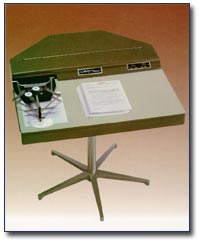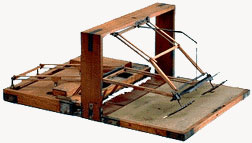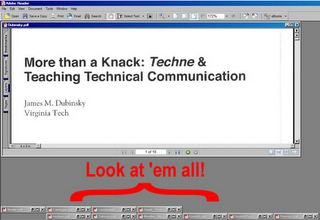I just came across a note I made while watching the December 20, 2004 Charlie Rose interview with Sir Paul Nurse, Nobel Prize winner and Joint Director General of Cancer Research UK.
Nurse discussed the important role of technological innovations in research for driving changes in thinking about science. He described better understanding as a being a result of more precise instruments for measuring and imaging physiological (and other) phenomena.
I was wondering why that hasn't been the case with writing studies.
Friday, April 29, 2005
Saturday, April 23, 2005
Autopen and the distant hand of authorship
This somewhat recent Talk of the Town from the New Yorker raises some interesting questions about what happens when a writer is physically removed from the writing he or she is doing. I find it facinating that, despite Margaret Atwood's argument, remote signing doesn't feel the same.
Even more intersting, to me at least, is how similar Autopen looks to Thomas Jefferson's polygraph machine. Really, I guess its just a matter of scale as to how removed the writer is from writing on each machine. La plus ca change...

DAMILIC Corporation's Autopen [from damilic.com]


Jefferson's polygraph [from monticello.org]
Also mentioned in the Talk piece, LeapFrog’s FLY pentop computer and Margaret Atwood's tragically named Unotchit "gizmo".
Even more intersting, to me at least, is how similar Autopen looks to Thomas Jefferson's polygraph machine. Really, I guess its just a matter of scale as to how removed the writer is from writing on each machine. La plus ca change...

DAMILIC Corporation's Autopen [from damilic.com]


Jefferson's polygraph [from monticello.org]

Also mentioned in the Talk piece, LeapFrog’s FLY pentop computer and Margaret Atwood's tragically named Unotchit "gizmo".
Thursday, April 21, 2005
Technological Convergence -- helping me move
Craig's List + Google Maps = good resource for moving: http://www.paulrademacher.com/housing/
Thursday, April 14, 2005
Annotate your childhood
My new favorite Cool Tool is Google Map's satellite imagery feature. Lots of folks have been spending time clicking and dragging around the locations of their past and present, leading to the phenomenon of Memory Maps. This annotated example from megpickard's photostream is just too cool.

Annotated memory map [from megpickard's photostream]


Annotated memory map [from megpickard's photostream]

Wednesday, April 13, 2005
Textual coordination 1.6: Planning for later use
43 Folders has a post about Anne "Bird by Bird" Lamott’s writerly practice of carrying index cards at all times. I'm fascinated by the idea that we must "capture" our ideas in the moment to prevent their slipping away and that by having them on index cards, we can "use" them later. I'm even more interested to know how many of these cards, once written on, actually get used. I stage a lot of information just in case I might ever need it again. But often don't.
Monday, April 04, 2005
Saturday, April 02, 2005
Materiality of Textual Coordination
I've argued that textual coordination involves both a cognitive and manual dexterity. In order to coordinate documents, one often need to bring them in to close proximity on or off screen. I recently described the number of .pdfs I'm reading on-screen these days and one tool that helps me do this is my scroll wheel mouse. But my scroll wheel has been a bit stiff lately. The damn cheap mouse is practically welded together, so I had to go in through the underside and use a paper clip to channel just a *touch* of lubricant to the wheel axle. It helped for a while, but it's starting to stick again. Dern.

It's smooth scrolling from here on out, boys!

It's smooth scrolling from here on out, boys!

Friday, April 01, 2005
Textual coordination 1.6: Pdfs
The nice thing about electronic journals is their instantaneity. I'm able to get hold of much of the literature I need at a moment's notice. And I can download it as a .pdf. Now, I've got a bunch of reading to do on the rhetorical concept of techne.
Because I've only got a cheap printer at home, I'm having a go at doing all my reading and note-taking on-screen. There's a reason for this. I'm trying to eliminate the double process of my old work process (read and annotate printed documents, then sit in front of the computer with them and "type up" my notes") and go directly to note-taking in the target environment -- digital -- essentially enabling me to "write" sections of my dissertation by copy/pasting from my copious notes. I've even gone so far as to write my notes in "sentence" form, so they may be more easily assembled:
One difficulty I've run into is managing my document views. The actions I need to perform (reading several articles in a particular sequence and moving back and forth between articles to compare points) aren't easy given a limited screen size and clunky way of moving amongst several documents. I've got four down, seven to go. We'll see how long this madness lasts.

Not the easiest way to coordinate texts.
Because I've only got a cheap printer at home, I'm having a go at doing all my reading and note-taking on-screen. There's a reason for this. I'm trying to eliminate the double process of my old work process (read and annotate printed documents, then sit in front of the computer with them and "type up" my notes") and go directly to note-taking in the target environment -- digital -- essentially enabling me to "write" sections of my dissertation by copy/pasting from my copious notes. I've even gone so far as to write my notes in "sentence" form, so they may be more easily assembled:
Dubinsky argues that "knowing how" is a reflective and contingent kind of rhetorical knowledge that differs from "knowing 'how to'" (131).
One difficulty I've run into is managing my document views. The actions I need to perform (reading several articles in a particular sequence and moving back and forth between articles to compare points) aren't easy given a limited screen size and clunky way of moving amongst several documents. I've got four down, seven to go. We'll see how long this madness lasts.

Not the easiest way to coordinate texts.

Subscribe to:
Comments (Atom)

